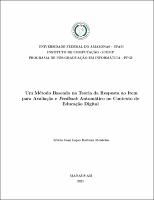| ???jsp.display-item.social.title??? |


|
Please use this identifier to cite or link to this item:
https://tede.ufam.edu.br/handle/tede/8406| ???metadata.dc.type???: | Dissertação |
| Title: | Um método baseado na Teoria da Resposta ao Item para avaliação e feedback automático no contexto de educação digital |
| Other Titles: | A method based on Item Response Theory for automatic assessment and feedback in the context of digital education |
| ???metadata.dc.creator???: | Monteiro, Edwin Juan Lopes Barboza  |
| ???metadata.dc.contributor.advisor1???: | Barreto, Raimundo da Silva |
| ???metadata.dc.contributor.referee1???: | Oliveira, Elaine Harada Teixeira de |
| ???metadata.dc.contributor.referee2???: | Cavalcanti, Francisca Maria Coelho |
| ???metadata.dc.contributor.referee3???: | Primo, Tiago Thompsen |
| ???metadata.dc.description.resumo???: | A avaliação dos conhecimentos de estudantes é tarefa corriqueira no âmbito da educação, seja para avaliar o aprendizado ou mediar a seleção de candidatos em vestibulares. Os exames que empregam uma avaliação baseada em questões de múltipla escolha, onde o aluno assinala itens durante o tempo de prova e, depois, recebe um feedback sobre a sua nota, não oferecem ao estudante contribuições significativas para o entendimento de seu desempenho. O objetivo geral deste estudo é fornecer, tanto para estudantes quanto para professores, um feedback formativo a partir da estimação das habilidades do examinando e dificuldade dos itens, por meio de uma técnica estatística denominada Teoria da Resposta ao Item (TRI). Esta técnica produz um modelo de dados sobre o desempenho dos estudantes baseado na análise das respostas coletadas nos exames. Dois experimentos foram realizados utilizando dados de um exame aplicado em uma escola pública de ensino médio do Amazonas. Os resultados obtidos indicam que há uma quantidade valiosa de informações que permitem analisar a relação entre os diversos itens e as habilidades estimadas. É possível classificar os alunos em uma escala de habilidade de modo que o próprio discente pode localizar sua posição em uma disciplina e simular quais tópicos podem ser estudados para obter uma maior habilidade. Do ponto de vista do professor é possível analisar quais tópicos foram mais difíceis para a turma, assim como analisar se um item elaborado está em conformidade com as aulas ministradas. Caso contrário, o professor pode refazer o item ou alterar o nível de dificuldade. Os resultados proporcionaram informações significativas que permitem a elaboração de um feedback formativo capaz de fornecer aos examinandos e avaliadores as diretrizes necessárias para investigar dificuldades e contribuir para um melhor rendimento no processo de ensino-aprendizagem. |
| Abstract: | The assessment of students' knowledge is a common task in the field of education, either to assess learning or to mediate the selection of candidates in entrance exams. Exams that employ an assessment based on multiple choice questions, in which the student marks items during the exam time and then receives feedback on his grade, do not offer the student significant contributions to understanding his performance. The general objective of this study is to provide, for both students and teachers, formative feedback from the estimation of the ability of students and difficulty of the items, through a statistical technique called Item Response Theory (IRT). This technique produces a model of data on student performance based on the analysis of the responses collected in the exams. Two experiments were conducted using data from an exam administered in a public high school in Amazonas. The results obtained indicate a valuable amount of information that allows analyzing the relationship between the various items and the estimated abilities. It is possible to classify students on a hability scale so that the student himself can locate his position in a discipline and simulate which topics can be studied to obtain greater hability. From the teacher's point of view, it is possible to analyze which topics were more difficult for the class and analyze whether an elaborated item is taught. Otherwise, the teacher can redo the item or change the difficulty level. The results provided significant information that allows the elaboration of formative feedback to provide the examinees and evaluators with the necessary guidelines to investigate difficulties and contribute to a better performance in the teaching-learning process. |
| Keywords: | Formative feedback Item Response Theory Virtual Learning Environment Educação digital Ensino e aprendizagem |
| ???metadata.dc.subject.cnpq???: | CIÊNCIAS EXATAS E DA TERRA |
| ???metadata.dc.subject.user???: | Feedback Formativo Teoria da Resposta ao Item Avaliação Automática Ambiente Virtual de Aprendizagem TRI AVA |
| Language: | por |
| ???metadata.dc.publisher.country???: | Brasil |
| Publisher: | Universidade Federal do Amazonas |
| ???metadata.dc.publisher.initials???: | UFAM |
| ???metadata.dc.publisher.department???: | Instituto de Computação |
| ???metadata.dc.publisher.program???: | Programa de Pós-graduação em Informática |
| Citation: | MONTEIRO, Edwin Juan Lopes Barboza. Um método baseado na Teoria da Resposta ao Item para avaliação e feedback automático no contexto de educação digital. 2021. 53 f. Dissertação (Mestrado em Informática) - Universidade Federal do Amazonas. Manaus, 2021. |
| ???metadata.dc.rights???: | Acesso Aberto |
| URI: | https://tede.ufam.edu.br/handle/tede/8406 |
| Issue Date: | 22-Jul-2021 |
| Appears in Collections: | Mestrado em Informática |
Files in This Item:
| File | Description | Size | Format | |
|---|---|---|---|---|
| Dissertação_EdwinMonteiro_PPGI.pdf | Dissertação_EdwinMonteiro_PPGI | 4.29 MB | Adobe PDF |  Download/Open Preview |
Items in DSpace are protected by copyright, with all rights reserved, unless otherwise indicated.




